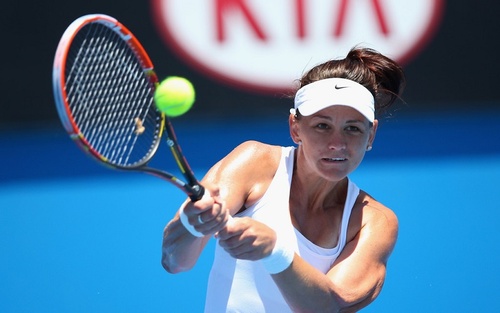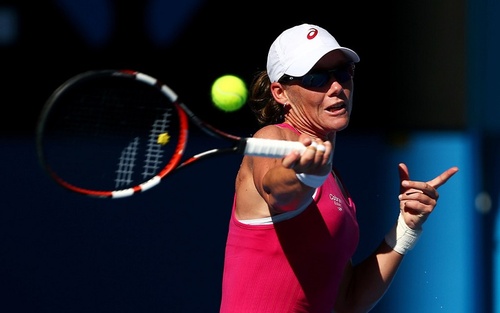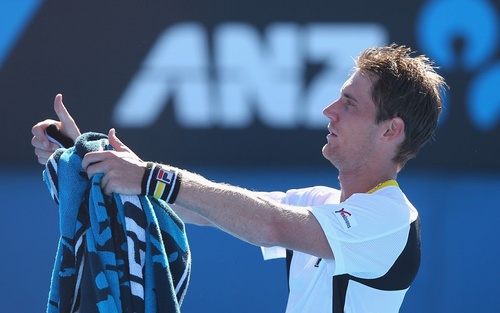Don't miss any stories → Follow Tennis View
FollowStosur, Dellacqua, Ebden Lead Surging Aussies in Melbourne
Typically, the Australian contingent has struggled at the Australian Open since its last winner in Mark Edmondson 38 years ago. A relatively bare period of quality tennis players combined with the home-town pressure and the emergence of the heavy-weight tennis countries (the United States in particular) are perhaps the reasons. Year after year, a cluster of promising young Australian tennis players fall in the early rounds, and fans are left wondering whether they’ll ever break the drought. But something is different at Melbourne Park this year. Whether it’s the lack of expectation of the crowd, or whether the Australians are finding their groove somewhere between being favorite and underdog, the local players seem to be finally finding a certain degree of comfort on Australian courts.

The experienced Australians led the way on day one at Melbourne Park as a considerably impressive three out of seven won through to the second round. Among the winners was popular and underrated lefty Casey Dellacqua, Australia’s last major winner Sam Stosur and the ever-trying Matthew Ebden. It was seemingly the steadiness shown by the Aussies that underlined their wins as they allowed their opponents to self-destruct through unforced errors.
Casey Dellacqua was particularly impressive after disposing of former world No. 2 Vera Zvonareva. The steadiness shown by Dellacqua was notable as the 120th-ranked West Australian was able to use every ounce of her experience. Zvonareva made a total of 43 unforced errors to just 14 winners and won just 54% of her first serves. With Dellacqua’s serve almost impenetrable by not having her service game broken once and winning 87% of second-serve points, she took just over an hour and a quarter to seal her entry into the second round.
In her post-match press conference, Dellacqua admitted she was mindful of the issues that Zvonareva would experience in her first grand slam since Wimbledon 2012.
“I wanted to make her work for every point” she said. “I know I have been out injured with a couple of surgeries, and that first big match or first big tournament coming back, I know how it feels. I have been there and done that. I wanted to make her play as many balls as I could to make her feel like she was under a lot of pressure and create a few errors from her side.”

Stosur continued the good run of Aussies on Rod Laver Arena with the dismantling of Czech Klara Zakopalova. Stosur was calm and controlled on Rod Laver Arena as she put the woes of previous years behind her and powered into the second round. The former US Open champion showed the difference that three days can make as she overcame the foe to whom she lost in straight sets last week at Hobart. Although the match statistics don’t portray any huge disparity between the two players, Stosur appeared the far more patient player as she won the crucial points in the tight 6-4 6-4 affair.
Stosur put this patience down to particular things she learnt in her loss to Zakopalova just 72 hours before the round one clash.
“I knew she was going to hit some winners, and she was going to play some really good points,” said the Aussie No. 1. “I also knew if I didn't have a shot and stayed in there and used my slice, which I didn't think she liked too much in Hobart, then I was going to be able to get myself back in the point even if I was down. Like I said, she was getting some winners, but I also had to think I was going to be able to hang in there as well until I got an opportunity to try and hit a winner or do something I really wanted to do.”

The fruitful afternoon for the Australian contingent was finished by a spunky Matt Ebden, who won in a see-sawing five-set affair against flamboyant Frenchman Nicolas Mahut. Ebden raced out to a two-set lead before his accuracy and his control deserted him in the third and fourth sets. Echoing what occurred in Stosur’s win, Ebden won the crucial points and confined Mahut to a disappointing first-round loss. An all-too-familiar story had seemed to be playing out midway through the match, for Ebden had lost a five-setter at the same point in last year’s Australian Open and was bageled in the fourth set this time. While both players tended to produce their best and their worst tennis at will, the statistics of the final set gave a good narrative as to how the match played out. Their winners were equal, and their first serve percentages were equal, but there were seven more unforced errors off the racquet of the Frenchman which ultimately cost him victory.
When asked in his post-match press conference, Ebden acknowledged his lack of fitness for the drop in intensity but also recognized the vocal home support for helping him home with the victory.
“There was a little bit of a drop in my energy and intensity [in the third set],” he admitted. “Obviously, a guy like that is going to step up and start crushing the ball. He probably went 30, 40 minutes and made less than three or four errors. He really lifted his game. I knew that was going to happen. I tried to be a bit more aggressive. I had a breakpoint back at 5-4 late in the third set, but he played a good game to get out of it.”
“Physically I wasn't so good,” said Ebden of the match’s later stages. “The last three or four weeks I had a bit of an accident with my ankle, so the last three or four weeks I wasn't able to train much. I just wanted to be fit and ready to play here. I'm just glad I was able to get some lift from the crowd in the end and pull it out.”
After years of Australian failures at the tournament, the expectations of local fans have dropped significantly. This has perhaps played into the Australian players’ hands as they seem to be playing under very little pressure to perform. It is as if, by suffering for the past 38 years, any result past the first round is a blessing for the Australian players and fans. This embedded mindset is undoubtedly contributing to the rising good fortunes of some of Australia’s long-term underachievers. And while there is little chance that any Australian male or female player can progress past the round of 16 in 2014, the freedom and confidence with which they’re playing could eventually lead to a breakthrough in the years ahead.










